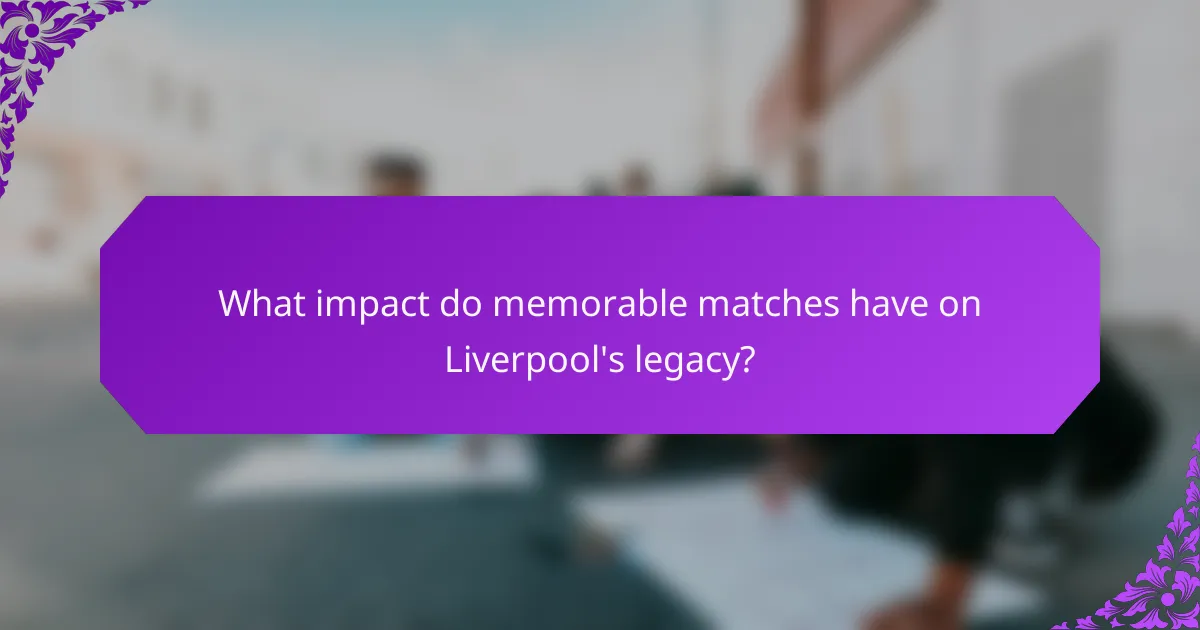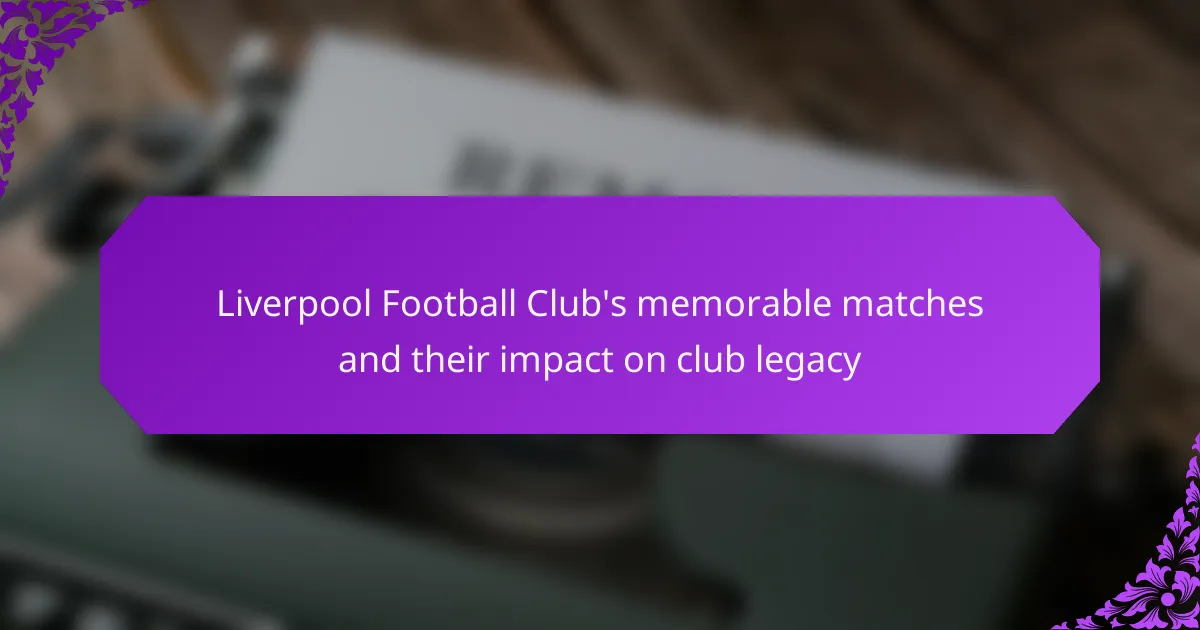Liverpool Football Club is renowned for its memorable matches that have significantly shaped its legacy. Key examples include the 2005 UEFA Champions League Final, where Liverpool staged a remarkable comeback from a 3-0 halftime deficit against AC Milan, often referred to as “The Miracle of Istanbul.” Another notable match is the 1989 FA Cup Final, where Liverpool triumphed over Everton in a thrilling 3-2 contest. Additionally, the 2019 UEFA Champions League semi-final against Barcelona highlighted Liverpool’s resilience as they overturned a 3-0 first-leg loss to win 4-0 at Anfield. These iconic matches not only enhance the club’s rich history but also foster a strong sense of identity and pride among its supporters.

What are Liverpool Football Club’s most memorable matches?
Liverpool Football Club’s most memorable matches include the 2005 UEFA Champions League Final against AC Milan. Liverpool trailed 3-0 at halftime but staged a remarkable comeback to win 3-3 and triumph 3-2 in a penalty shootout. This match is often referred to as “The Miracle of Istanbul.” Another significant match was the 1989 FA Cup Final, where Liverpool defeated Everton 3-2. This match is remembered for its intensity and the emotional context surrounding it. Additionally, the 2019 UEFA Champions League semi-final against Barcelona is notable. Liverpool overcame a 3-0 first-leg deficit to win 4-0 at Anfield, progressing to the final 4-3 on aggregate. These matches have greatly contributed to Liverpool’s legacy and are celebrated by fans and historians alike.
How have these matches shaped the club’s identity?
Memorable matches have significantly shaped Liverpool Football Club’s identity. These games have created a legacy of resilience and passion. Historic victories, such as the 2005 UEFA Champions League final, showcased the team’s ability to overcome adversity. The comeback from a 3-0 deficit to win on penalties solidified Liverpool’s reputation for fighting spirit. Matches against rivals, like Manchester United, have intensified the club’s competitive nature. These encounters foster a strong sense of community among fans. The emotional highs and lows of these matches contribute to a collective identity. Overall, these experiences define what it means to be part of Liverpool Football Club.
What specific events occurred in these matches that stand out?
Liverpool Football Club’s memorable matches feature several standout events. One significant event occurred during the 2005 UEFA Champions League Final. Liverpool came back from a 3-0 deficit against AC Milan to win the match 3-3, eventually triumphing in a penalty shootout. This remarkable comeback is often referred to as the “Miracle of Istanbul.”
Another notable event took place in the 1989 FA Cup Final. Liverpool faced Everton in a fiercely contested match. The game ended 3-2 in favor of Liverpool, solidifying their dominance in English football at that time.
Additionally, the 2019 UEFA Champions League Final saw Liverpool defeating Tottenham Hotspur 2-0. Mohamed Salah scored a penalty early in the match, setting the tone for their victory. These events not only highlight Liverpool’s resilience but also contribute significantly to the club’s legacy in football history.
How did the outcomes of these matches affect fan perception?
The outcomes of these matches significantly shaped fan perception of Liverpool Football Club. Victories in key matches enhanced the club’s reputation for resilience and skill. Fans felt a deep sense of pride and loyalty following memorable wins, such as the 2005 Champions League final. This match, often referred to as the “Miracle of Istanbul,” solidified the belief that Liverpool could overcome any challenge. Conversely, losses in critical matches sometimes led to disappointment and frustration among supporters. Such outcomes prompted discussions about team performance and management decisions. Overall, match results directly influenced fan emotions and their connection to the club’s identity.
Why are these matches considered pivotal in Liverpool’s history?
These matches are considered pivotal in Liverpool’s history due to their significant impact on the club’s legacy and identity. Key victories, such as the 2005 UEFA Champions League final, showcased Liverpool’s resilience and determination. The iconic comeback from a 3-0 deficit against AC Milan exemplified the club’s fighting spirit. Additionally, the 1989 FA Cup semi-final against Nottingham Forest is remembered for its emotional weight and the Hillsborough disaster. This tragedy shaped the club’s community ties and led to major reforms in stadium safety. Each pivotal match not only influenced the club’s achievements but also solidified its status in football history. These events resonate with fans and embody the essence of Liverpool FC.
What historical context surrounds these memorable matches?
Liverpool Football Club’s memorable matches are deeply rooted in the club’s rich history. The club was founded in 1892 and has since become one of the most successful teams in football. Significant matches often reflect pivotal moments in the club’s journey. For instance, the 2005 UEFA Champions League Final against AC Milan is known as the “Miracle of Istanbul.” Liverpool came back from a 3-0 deficit to win on penalties. This match is a testament to the club’s resilience and fighting spirit.
Another notable match is the 1989 FA Cup Final against Everton, which was played shortly after the Hillsborough disaster. This tragedy claimed 96 lives and profoundly impacted the club and its supporters. The match served as a moment of unity and remembrance for the victims.
In addition, Liverpool’s 1977 European Cup Final victory against Borussia Mönchengladbach marked the club’s first European triumph. This victory established Liverpool as a dominant force in European football. Each of these matches is not just a reflection of sporting achievement but also encapsulates broader social and cultural narratives surrounding the club.
How do these matches compare to other significant games in football history?
Liverpool Football Club’s memorable matches are among the most significant in football history. These matches often showcase dramatic comebacks, high stakes, and pivotal moments that resonate with fans worldwide. For instance, the 2005 UEFA Champions League final against AC Milan is often compared to other historic finals due to its remarkable turnaround. Liverpool was down 3-0 at halftime but equalized in the second half, ultimately winning in a penalty shootout. This match is frequently cited as one of the greatest comebacks in sports history.
In addition, Liverpool’s 1984 European Cup final against AS Roma is notable for its tension and high drama. It marked the club’s third European title and is remembered for the emotional penalty shootout. Comparatively, these matches reflect the club’s resilience and ability to perform under pressure, akin to other legendary games like the 1999 UEFA Champions League final, where Manchester United also executed a stunning comeback.
Moreover, Liverpool’s matches often influence the narrative of football history, contributing to the club’s legacy. The intensity and significance of these encounters have cemented Liverpool’s reputation as a formidable force in football. Thus, Liverpool’s memorable matches not only stand out in the club’s history but also hold a prominent place in the broader context of significant football games.

What impact do memorable matches have on Liverpool’s legacy?
Memorable matches significantly enhance Liverpool’s legacy. These matches create unforgettable moments that resonate with fans and players alike. Notable examples include the 2005 UEFA Champions League final, where Liverpool came back from a 3-0 deficit to win. This match is often referred to as “The Miracle of Istanbul.” It solidified Liverpool’s reputation for resilience and determination. Additionally, memorable matches contribute to the club’s rich history and tradition. They create a sense of identity and pride among supporters. The impact of these matches is reflected in Liverpool’s global following and cultural significance in football.
How do these matches influence the club’s reputation over time?
Memorable matches significantly enhance Liverpool Football Club’s reputation over time. These matches create a lasting legacy that resonates with fans and the broader football community. High-stakes victories, such as the 2005 UEFA Champions League final, showcase the club’s resilience and skill. Such achievements elevate the club’s status in football history. Consistent performance in crucial matches builds a reputation for competitiveness. This reputation attracts new fans and sponsors, further solidifying the club’s standing. Over decades, iconic matches become part of the club’s narrative and identity. The emotional connection formed through these experiences fosters loyalty among supporters. Ultimately, memorable matches contribute to a rich heritage that defines Liverpool’s legacy in the sport.
What role do memorable matches play in shaping club traditions?
Memorable matches play a crucial role in shaping club traditions. They create shared experiences that unite fans and players. For Liverpool Football Club, iconic games like the 2005 UEFA Champions League final foster a sense of identity. Such matches are often recounted in club narratives and folklore. They contribute to the club’s history and legacy, enhancing emotional connections. Fans celebrate these moments through rituals, songs, and commemorations. Historical victories and dramatic comebacks become part of the club’s ethos. This legacy influences future generations of supporters and players.
How do these matches affect future generations of players and fans?
Memorable matches of Liverpool Football Club inspire future generations of players and fans. These matches showcase the club’s resilience and skill. They create a rich history that fans cherish and share. Young players are motivated by the legacy of past triumphs. Iconic victories, like the 2005 Champions League final, teach valuable lessons about determination. Fans learn the importance of loyalty and passion through these experiences. The emotional narratives surrounding these matches foster a strong community. This community encourages new fans and players to engage with the club’s history.
What lessons can be learned from Liverpool’s memorable matches?
Liverpool’s memorable matches teach resilience, teamwork, and the importance of belief. Resilience is evident in their comeback victories, such as the 2005 UEFA Champions League final against AC Milan. In that match, Liverpool overcame a three-goal deficit to win on penalties. Teamwork is highlighted in their coordinated plays and defensive strategies, exemplified in their 1984 European Cup victory. The importance of belief is showcased through their unwavering confidence in crucial moments, as seen in the 2019 UEFA Champions League semi-final against Barcelona. Liverpool’s ability to perform under pressure has become a defining trait, reinforcing their legacy as a club that never gives up.
How can these matches inspire current and future players?
Memorable matches of Liverpool Football Club can inspire current and future players by showcasing resilience and determination. These matches often highlight the team’s ability to overcome adversity. For instance, the 2005 UEFA Champions League final demonstrated a remarkable comeback from a 3-0 deficit to win in penalties. This event illustrates that perseverance can lead to success, even in seemingly hopeless situations. Additionally, the club’s rich history of triumphs fosters a strong sense of identity and pride among players. When players understand the legacy of their predecessors, it motivates them to strive for excellence. The emotional connection fans have with these matches further amplifies the drive to succeed. Ultimately, the lessons learned from these historic moments can guide players in their professional journeys.
What strategies can be derived from the successes and failures in these matches?
Strategies derived from successes in matches include focusing on teamwork and effective communication. Successful matches often highlight the importance of strategic formations. For example, Liverpool’s use of the 4-3-3 formation maximized their attacking potential. Failures reveal the need for adaptability and resilience. Matches where Liverpool struggled often showed a lack of defensive coordination. Analyzing these failures emphasizes the importance of player rotations to maintain fitness levels. Historical performance data supports that teams with strong defensive structures tend to achieve better results. Therefore, balancing offensive strategies with solid defense is crucial for long-term success.

How do Liverpool’s memorable matches resonate with fans today?
Liverpool’s memorable matches resonate with fans today through shared emotional experiences and cultural significance. Iconic games like the 2005 UEFA Champions League final evoke pride and unity among supporters. The miraculous comeback from 3-0 down against AC Milan remains a symbol of resilience. Fans recall such moments during matches, fostering a strong community spirit. Historical victories, like the 1984 European Cup final, are celebrated in chants and stories. These matches are often referenced in discussions about the club’s identity. They reinforce loyalty and passion across generations of supporters. The legacy of these games continues to shape the club’s narrative and fan engagement.
What emotional connections do fans have to these matches?
Fans of Liverpool Football Club have deep emotional connections to memorable matches due to shared experiences and collective identity. These matches often evoke feelings of pride, nostalgia, and unity among supporters. Historic victories, such as the 2005 UEFA Champions League final, symbolize resilience and hope, reinforcing fans’ loyalty. The atmosphere during these games creates lasting memories, fostering a sense of belonging within the community. Emotional connections are also heightened by personal stories linked to these matches, such as family traditions or memorable celebrations. The club’s rich history and iconic moments serve as a source of inspiration for fans, solidifying their emotional investment in the team’s journey.
How do fans commemorate these matches in their culture?
Fans commemorate Liverpool Football Club’s memorable matches through various cultural practices. They create chants and songs that celebrate significant victories. These musical tributes are often sung in stadiums during games. Fans also gather in pubs and homes to relive match highlights. They share stories and memories, reinforcing community bonds. Merchandise, like scarves and jerseys, features dates and scores of key matches. Social media platforms serve as spaces for fans to express their pride. Collectively, these actions strengthen the club’s legacy and fan identity.
What are the best practices for celebrating Liverpool’s football legacy?
The best practices for celebrating Liverpool’s football legacy include organizing commemorative events, engaging with the community, and preserving historical memorabilia. Commemorative events can feature match reenactments or fan gatherings. Engaging with the community fosters a sense of belonging among supporters. Liverpool FC’s history, including its 19 league titles and six European Cups, can be highlighted during these celebrations. Preserving memorabilia, such as jerseys and trophies, contributes to the club’s rich heritage. Collaborating with local schools and organizations can enhance outreach efforts. Utilizing social media platforms allows for broader engagement with fans worldwide. Creating documentaries or podcasts about memorable matches can further educate fans on the club’s legacy.
How can fans engage with the club’s history through memorable matches?
Fans can engage with Liverpool Football Club’s history through memorable matches by attending match screenings and participating in discussions. These events often feature highlights from iconic games, fostering a sense of connection to the club’s legacy. Fans can also visit the club’s museum, which showcases memorabilia from historic matches, providing context and emotional resonance. Additionally, reading books and articles about these matches can deepen fans’ understanding of the club’s journey. Engaging on social media platforms allows fans to share their experiences and memories related to these matches. Historical match statistics and narratives can be found on the club’s official website, offering insights into pivotal games. Overall, these activities create a richer appreciation of Liverpool’s storied past.
What activities can enhance the appreciation of these significant games?
Engaging in activities such as watching match highlights can enhance appreciation of Liverpool Football Club’s significant games. Analyzing key moments in these matches provides insights into strategies and player performances. Attending live matches creates an immersive experience that deepens emotional connections. Participating in fan discussions or forums allows sharing of perspectives and memories. Visiting the club’s museum offers historical context and memorabilia related to memorable matches. Reading books or articles about the club’s history enriches understanding of its legacy. Collecting memorabilia associated with these games fosters a personal connection to the club’s heritage. These activities collectively deepen appreciation for Liverpool’s impactful moments in football history.
Liverpool Football Club is the primary entity discussed in the article, which examines its most memorable matches and their impact on the club’s legacy. Key matches include the 2005 UEFA Champions League Final, known as “The Miracle of Istanbul,” where Liverpool staged a remarkable comeback against AC Milan, and the emotional 1989 FA Cup Final against Everton. The article highlights how these significant games have shaped the club’s identity, influenced fan perceptions, and contributed to its historical narrative. Additionally, it explores the emotional connections fans have with these matches and the ways they commemorate and engage with the club’s rich history.
